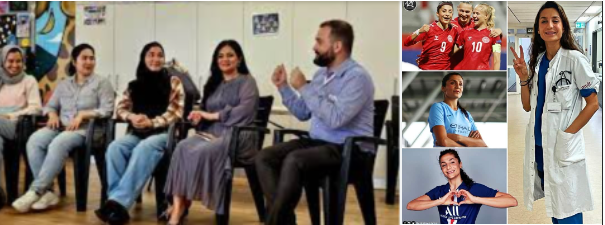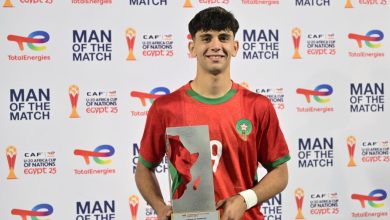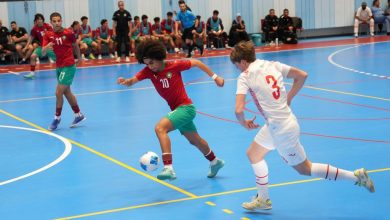Nadia Nadim, a former refugee who fled Afghanistan as a child and later became a Danish international footballer, believes that players and organisations such as FIFA can promote positive social change through the sport’s incredible popularity.

HIBAPRESS-RABAT-FIFA
The Danish international fled Afghanistan with her family as a child
“Football can open doors that would otherwise remain closed,” says Nadim
Female footballers can have ‘huge impact’ if they champion social causes
Nadia Nadim, a former refugee who fled Afghanistan as a child and later became a Danish international footballer, believes that players and organisations such as FIFA can promote positive social change through the sport’s incredible popularity.
“I think we have a huge responsibility because of the position we are in,” says the player, who has made over 100 appearances for Denmark and scored 38 goals. “For me, FIFA – and football in general – has a powerful voice and the power to say: ‘This is what we want.'”
Speaking to staff at world football’s governing body during a visit to its headquarters in Zurich, she explained that football could open doors that would otherwise remain closed. “Football can change views because it is something that is close to us. Everybody loves sport; everybody loves football because it is the most important sport on the planet.”
FIFA has highlighted the power of football to spread positive messages. The sixth of its strategic objectives for the 2023-2027 cycle is also focused on social responsibilities. “I know that FIFA tries to do a lot of things. I know that there are many NGOs that use sport around the world. Personally, I try to use football to open up dialogue with people,” adds the Dane.
“Sports is a great bonding experience. You start playing and boom, one thing leads to another,” she continues. “I love doing it because I know what impact it’s going to have. I’ve been on the other side! I know that little things can have a huge impact.”
FIFA.COM Football Unites the World
Sport and education can be empowering, and Nadim is proof of that. She grew up in a country where women were not allowed to leave the house without a male relative. She lost her freedom under the Taliban and later lived in poverty in a refugee camp in Denmark. She went on to become a professional footballer and, today, a qualified doctor.
“If you’re a girl in some parts of the world, you’re kind of put in a very, very small box. You’re very limited in what you’re allowed to do. Your life is mapped out – and by the time you’re 18 or 19, you’re married and good luck,” she said. But she remembers that the same neighbours who disapproved of her playing football as a child changed their minds after she started in Denmark.
“These same people who were telling me six months ago that I should quit came to me and asked, ‘Where should my daughter start playing? Can you take her? She could very well become an international player,'” she recalls.
Nadim is delighted with the way women’s football has developed in recent years, with the FIFA Women’s World Cup 2023 as a highlight. “I’m really proud to have been a part of it and I know that women’s football is growing to heights that we never even imagined before. It’s not going to happen overnight; it’s going to take a lot of hard work,” she said.
In 2021, FIFA helped evacuate around 160 Afghan athletes, officials and women’s rights activists under threat, as well as their close family members. Nadim follows what is happening in her home country very closely. “My younger sister Diana also played football with me and was the goalkeeper for the Afghan national team. She was really good when we were younger, we played on the same teams, and then she took up boxing and became a seven-time Danish champion,” she concludes.






